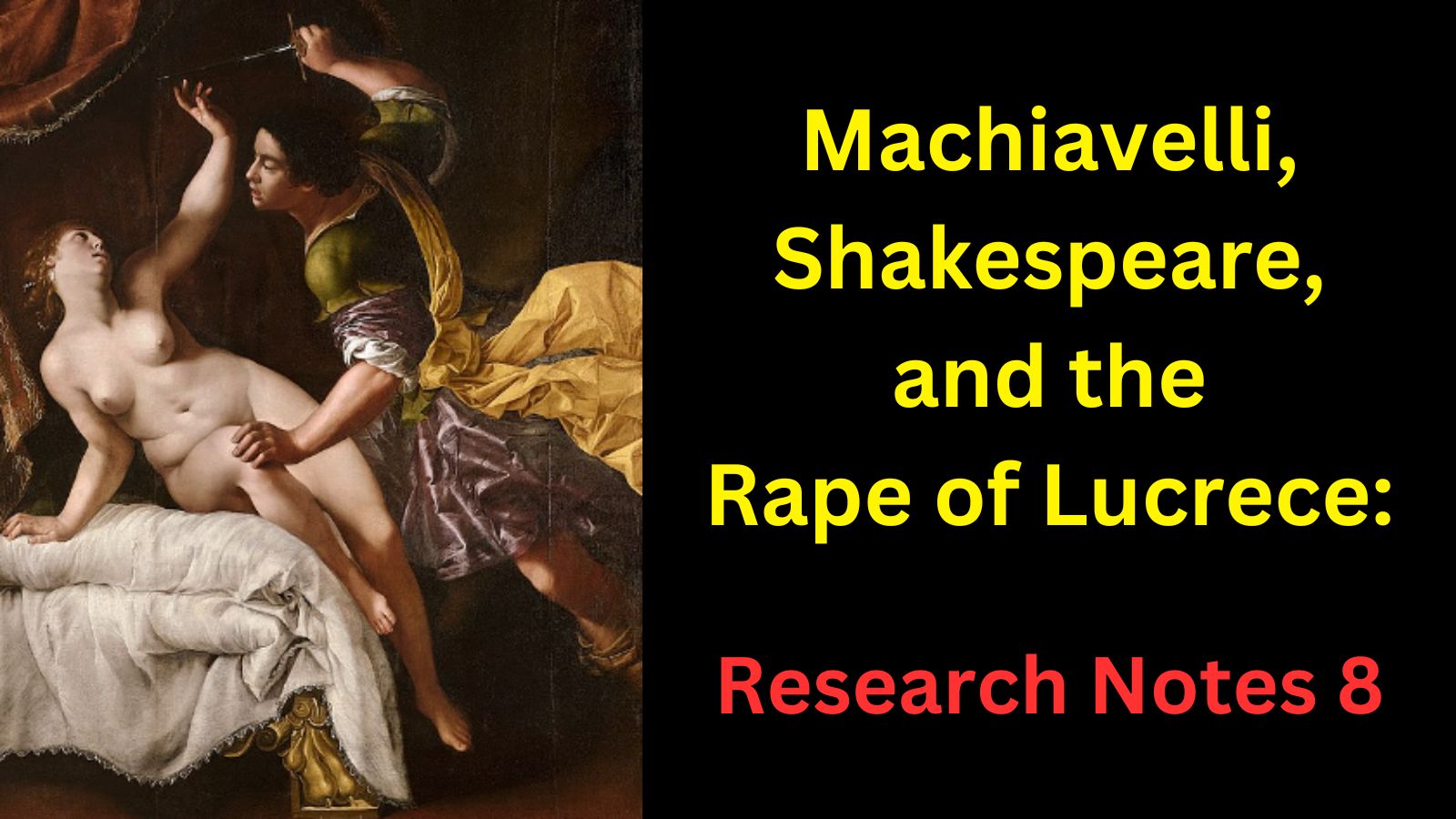
Last night I checked my copy of my former professor, John Roe's book, Shakespeare and Machiavelli, to see if he had anything to say about the Rape of Lucrece. I was pleased to find four useful references, all, unsurprisingly, in relation to the Roman play, Julius Casear.
Here they are:
Once he had brought the Henriad to its triumphal conclusion, Shakespeare resumed his interest in Roman themes, as seen earlier in Titus Andronicus and The Rape of Lucrece. Both those works demonstrate the importance to him of the theme of violation, and the implications it carries for such questions as tyranny and personal freedom. Julius Caesar pursues similar speculations in the larger arena of political debate (involving members of the senate directly in the action) and again dramatically portrays the tension between tyranny and liberty, in particular liberty of conscience. The play may also, if only to a limited extent, raise thoughts nearer home about the relationship of monarchy to republicanism. This aspect of Julius Caesar in turn requires that we extend our comparison with Machiavelli beyond the Principe and the Discorsi to include his Istorie Fiorentine, which reflects a similar and thought-provoking conflict between replublicanism and monarchy.
p. 133
In The Rape of Lucrece Lucius Junius Brutus's action in turning public opinion against the Tarquins, and thus ending the tyranny of monarchy, reflects the Machiavelli of the Discorsi and, discreetly, of the Istorie Fiorentine.
p. 153
Through Brutus [in Julius Caesar] Shakespeare raises one of the major problems of Renaissance ethics: the relationship of body to soul. In the Rape of Lucrece, that other work with republican dimensions, Shakespeare has Lucrece express horror at the violation of her soul through her body, and then depicts her attempt to find redemption through her bodily destruction. As is well known, St Augustine, insisting on the separateness of the two, condemned the historical Lucretia for her action.* Shakespeare, well aware of this threat to Lucrece's reputation, ensured that she died with sufficient pathos for it to be difficult for his readership to condemn her action without feeling callous. The enormity of her rape by Tarquin keeps our doubts in check as to whether she was right to kill herself. Brutus [in Julius Caesar] enjoys no such moral 'luck'. However, he resembles Lucrece closely in his anxiety over the act of killing and how it will be morally perceived, and demonstrates the obverse of her concern (to release her pure soul from its infected body) by wishing he could only terminate a corrupt soul without injuring the body:
We all stand up against the spirit of Caesar,
And in the spirit of men there is no blood.
O that we then could come by Caesar's spirit
And not dismember Caesar! But alas,
Caesar must bleed for it.
(2.1.167-71)
The comparison with Lucrece should help us form an estimate of Brutus, especially with regard to Shakespeare's conception of him. Critics who look for a fatal flaw in his arguments find something suspicious in passages such as the one just quoted. Notwithstanding, Brutus wrestles with a dilemma every bit as serious as that facing Lucrece. The soul's inability to escape the body means that intentions are necessarily prey to the actions that accompany them. Lucrece kills herself as the only means of preserving her reputation; but commentators have questioned whether she was justified in doing so. Brutus would kill the spirit of tyranny in Caesar, leaving the man whom it has possessed to live on. In so far as Roman spiritual conventions will allow, he is advocating a kind of exorcism. However, he recognizes that Caesar's blood must be shed if the less tangible element of tyranny is to be arrested. There can unfortunately be no mere dealing in abstractions and principles.
Despite the different emphasis each of them brings to the dilemma, an identical element runs through both Brutus' and Lucrece's deliberations.
p. 156
As a pragmatic kind of Machiavellian, Antony knows instinctively that blood is the element in which to find and exploit advantage. Whatever protest he makes at the horror of Caesar's murder must yield, in our evaluation, to the use he makes of it, just as in The Rape of Lucrece the dispassionate Lucius Junius Brutus seized the occasion of the protagonist's death, and the anger emanating from it, to turn the people against the Tarquins.
p. 162
This is very useful for my argument, though I don't entirely agree with the point that our doubts are kept in check by the enormity of the rape, especially since Brutus criticizes her act to her husband's face:
Thy wretched wife mistook the matter so,
To slay herself, that should have slain her foe.
stanza 261
The argument about the utility of blood is interesting, especially so in the case of the death of Lucrece, for her blood is described as being in part blackened - physically contaminated - by Tarquin. Lucrece's spilled blood certainly adds to the pathos, just as it provides an occasion for Brutus; it is as if the transition from blackened blood to blood oath speaks to a transition from the medieval to the Machiavellian. I want to do some more research, if time permits, into the Galenic conception of blood contamination and the humours, to see whether the idea of rape-blackened blood was something that was believed to be, a supposed natural phenomonon beyond poetic conceit.